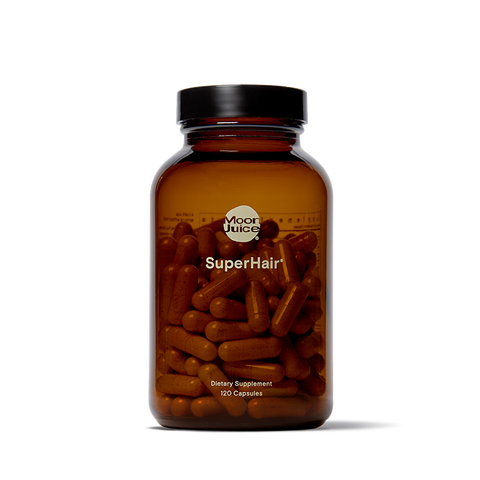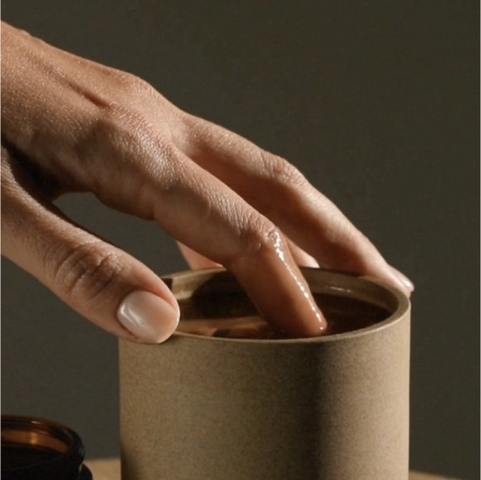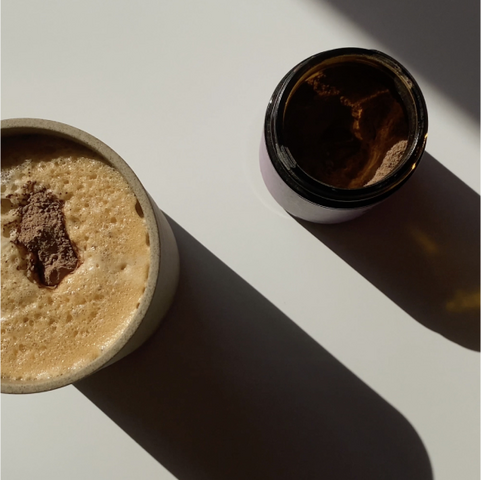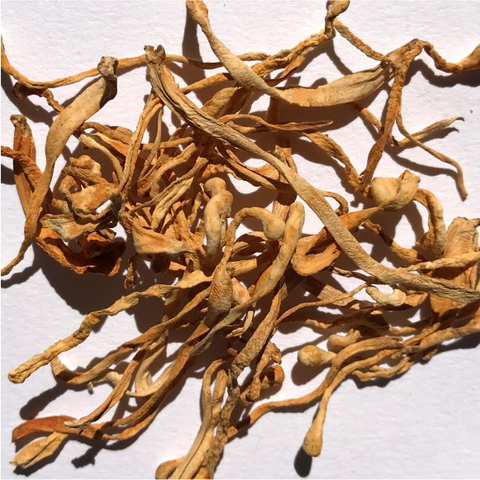Strong hair is healthy hair. It’s less likely to shed, break off, or develop split ends.
Your hair isn’t alive, but the hair follicles on your scalp are living structures containing the cells that turn into hair. You can set yourself up for hair success by caring for your strands from the outside in and inside out.
Genetics plays a role in determining your hair strength. But that’s not the end of the story. Lifestyle choices and environmental factors, like diet and sun exposure, can also influence how strong your strands are.
So, how can you strengthen your gorgeous strands and make them more resilient? Let’s dig into how to strengthen hair.
1. Use Hair Strengthening Products
The products you use on your hair can impact overall hair health. It’s crucial to opt for hair products formulated for your specific hair type. It’s true that once the hair exits the follicle, it can no longer repair itself, but how you care for your hair can still make a difference in its strength and appearance.
What kinds of products are formulated to strengthen hair? A shampoo, conditioner, or hair treatment containing proteins like keratin can boost your hair’s structural integrity by strengthening the hair shaft.
Moisturizing ingredients are also crucial for supporting hair strength, especially if your hair tends to be dry.
Hydrating your strands ensures they’re more flexible and prevents hair breakage.
Think of a dry pasta noodle. If you try to bend it, it’ll break easily. A moist, hydrated piece of pasta is much more flexible and less likely to break when bent. The same goes for unhealthy hair that’s parched vs. well-hydrated.
2. Be Gentle On Your Hair
How you treat your hair can greatly impact how strong it is. Overdoing it on dye sessions, heat styling, highlights, and brushing can make your hair more prone to breakage and damage.
Remember our pasta example? When your hair is wet, it’s a lot more bendy. Think: Your favorite yoga instructor.
Moisture is great for your hair, but when your hair is sopping wet right out of the shower, it’s more vulnerable to damage. Ripping through your hair with a brush when it’s soaked through with water will unnecessarily tear out hair and break it. Instead, opt for a gentle, wide-toothed comb for post-shower detangling.
And breakage doesn’t just happen with wet hair. Tugging and pulling at your strands anytime can stress out your scalp and hair follicles, leading to weak strands prone to split ends and shedding. We know you love an updo, especially when it comes to hot yoga, but opting for loose, flowy hairstyles that embrace your natural hair outside of sweat sessions can help promote stronger strands.
3. Limit Stress
Surprise, surprise. Stress is at it again. The connection between stress and hair strength is complex, but it’s clear that stress is no good for your strands.
High stress levels can impact your overall health thanks to the release of cortisol, aka the stress hormone. Too much cortisol can put your body into a perma-fight-or-flight mode, contributing to all sorts of adverse health effects, including poor sleep and hair loss.
Stress can also lead to a condition called telogen effluvium (TE). TE happens when a major stressor causes your hair follicles to enter the resting phase of growth (also known as the telogen phase) too early. Months after encountering the triggering stressor, you’ll experience hair issues, including hair that falls out more easily.
Chronic stress can also affect your immune system, making your body more vulnerable to illnesses that can affect hair and scalp health.
What can you do to limit stressors and conserve hair strength? Gentle hair care practices like those we mentioned can help, and so can learning how to manage your day-to-day stress with coping strategies like meditation, yoga, or whatever makes you feel more relaxed and in the moment.
4. Drink Enough H2O
Your hair isn’t made up of water like the rest of your body. In fact, it’s made up of a protein called Keratin, the same stuff your nails are made of. But hair cells still need H2O to regenerate and stay healthy.
Being dehydrated can actually lead to weaker hair follicles and make your hair more brittle. It might even lose its shine, too.
Hair growth might even slow if you’re chronically dehydrated and not drinking enough water since thirsty, malnourished hair follicles won’t generate healthy hair. Instead, they’ll produce fewer, weaker strands.
So grab that reusable water bottle and make sure to sip throughout the day — aiming for 6-8 glasses of 8 ounces per day. Eating hydrating foods like watermelon and citrus fruit can also help keep your water levels topped up.
5. Avoid Heat And UV Rays
The sun means serious business. Like your skin, your hair is vulnerable to the harmful effects of UV rays. And like with skin, UV sunlight can penetrate deeply into the hair shaft to impact structure, weakening it and making it more susceptible to breakage.
Heat styling can also cause weak and damaged hair, making it more likely to break off and thin out.
Signs your hair may need a heat break:
- It’s dry and brittle.
- It’s frizzy.
- It’s full of split ends.
- It’s prone to tangling.
Another sign that things are getting too hot for your hair to handle? Your scalp is itchy and uncomfortable. UV radiation doesn’t just target hair strands. UV radiation can also affect your scalp directly, disrupting the hair growth cycle at the source.
When you’re heading out into the sun, make sure to keep your head protected with a hat. And, if possible, keep clear of direct sunlight. If you have no choice but to be outside in the sunlight, consider adding UV protection hair products to your hair care routine.
6. Eat A Balanced Diet
Your hair is the way it is in part due to genetics you’ve inherited. But your diet also plays a major role in its appearance and strength. Nourishing your body with essential vitamins and minerals ensures those hair follicles have what they need to produce healthy, strong hair cells.
Some of the vitamins and minerals needed for strong, healthy hair include:
- Vitamin A: This vitamin is essential for sebum production, an oil that helps moisturize your scalp and prevents hair from getting too dry and brittle.
- Vitamin C: Vitamin C is crucial for collagen production, a type of protein that’s important for healthy hair growth.
- Biotin and other B Vitamins: Deficiencies in B Vitamins like Biotin can cause hair loss, so nourishing your body with plenty of B Vitamins is vital for healthy, strong hair.
- Omega-3 Fatty Acids: Juicy, moisture-producing fats help keep your scalp in tip-top shape, preventing dry hair that can lead to breakage.
- Iron: If you’re low in iron, you’re more likely to experience hair loss.
- Selenium: Helps protect your hair from damage that can lead to breakage and hair thinning.
7. Eat More Protein
Vitamins and minerals are crucial for optimal hair health but don’t forget to eat plenty of protein. After all, your hair is mostly made up of the protein Keratin.
Keratin is what gives hair its structure, elasticity, and strength. Getting enough protein ensures your body has the building blocks it needs to produce strong, Keratin-filled strands.
Whole foods high in protein and other essential nutrients include:
- Beans and legumes
- Fish
- Lean meats
- Nuts and seeds
If you notice signs of weak hair, adding these foods to your diet could help.
8. Take Vitamins
You can get healthy hair nutrients like vitamins, minerals, and protein from your diet, but getting optimal nutrition from diet alone can be challenging.
It can be tough to meet daily recommended amounts of good-for-you nutrients simply because life gets in the way. It’s not always easy to create meals that tick all the boxes.
And then there’s the state of modern agriculture. It’s not enough to eat a diet filled with whole, plant-based foods. Modern agricultural practices like monocropping and pesticide use have made it so that the nutrient content in food is less than it used to be.
That makes it doubly hard to get what you need from food alone. Enter: Supplements and vitamins for thicker, stronger hair.
You can use supplements to fill in nutrition gaps that might be contributing to your hair health woes. Supplementation is doubly important for hair strength if you have a nutrient deficiency since many deficiencies can cause hair loss and thinning.
9. Try A Hair Supplement
By the way, you don’t need to play a guessing game to make sure your hair is nourished from within. Hair-specific supplements can help you target hair concerns and support healthy, strong hair growth without getting a degree in pharmacology.
SuperHair® is a clinical strength hair supplement promoting healthier, stronger, thicker hair with a bioavailable multivitamin, adaptogens, botanicals, and micronutrients.
Sign Up, Nerd Out
Get wellness tips, education, and recipes
delivered straight to your inbox.
Get wellness tips, education,
and recipes delivered
straight to your inbox.
Takeaway
Taking care of your hair by using the right products, avoiding UV rays, and opting for gentle hair care routines can help prevent hair breakage and support strong strands. But strong hair also starts from the inside out.
You can achieve healthy, strong hair by eating a nutritious diet full of vitamins and minerals, getting plenty of protein, managing stress, and hydrating.
A hair supplement can also go a long way in filling in the gaps in your diet and giving your body everything it needs to produce resilient, damage-proof hair.
Now that you know how to strengthen hair, healthy hair is on the horizon. Just remember, these strategies won’t necessarily work overnight. It can take time to see results. But by consistently undertaking strategies to support healthy hair growth, you can strengthen your hair over time.
Sources
- Is hair texture determined by genetics? https://medlineplus.gov/genetics/understanding/traits/hairtexture
- Healthy hair: What is it? https://pubmed.ncbi.nlm.nih.gov/18004288/
- Shampoos and conditioners: What a dermatologist should know. https://www.ncbi.nlm.nih.gov/pmc/articles/PMC4458934
- The best vitamins and supplements for hair growth. https://health.clevelandclinic.org/the-best-vitamins-supplements-and-products-for-healthier-hair
- Guo EL, Katta R. Diet and hair loss: Effects of nutrient deficiency and supplement use. https://www.ncbi.nlm.nih.gov/pmc/articles/PMC5315033/
- Trueb RM. The impact of oxidative stress on hair. https://onlinelibrary.wiley.com/doi/pdf/10.1111/ics.12286
- How stress causes hair loss. https://www.nih.gov/news-events/nih-research-matters/how-stress-causes-hair-loss
- Telogen effluvium. https://my.clevelandclinic.org/health/diseases/24486-telogen-effluvium
- Tosti A, et al. Role of scalp health in achieving optimal hair growth and retention. https://pubmed.ncbi.nlm.nih.gov/33932025/
- Almohanna HM, et al. The role of vitamins and minerals in hair loss: A review. https://www.ncbi.nlm.nih.gov/pmc/articles/PMC6380979/
- Sebetic K, et al. UV damage of the hair. https://pubmed.ncbi.nlm.nih.gov/19138021
- Trueb RM. Effect of ultraviolet radiation, smoking and nutrition on hair. https://pubmed.ncbi.nlm.nih.gov/26370649/

.png?v=1695654752399)
.png?v=1695654764173)











